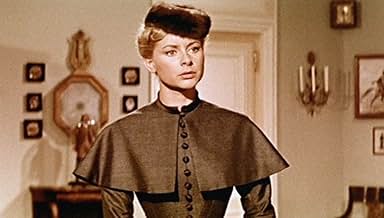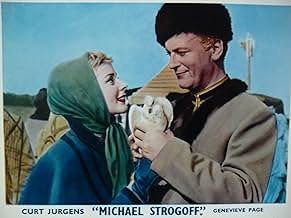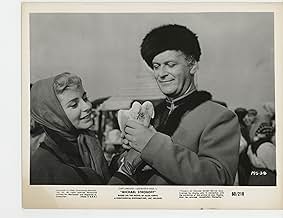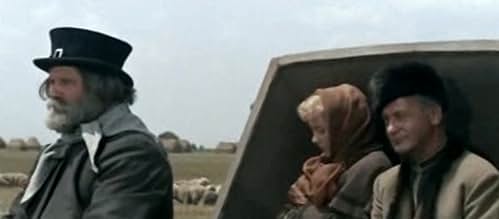Michel Strogoff
- 1956
- Tous publics
- 1h 51min
NOTE IMDb
6,0/10
714
MA NOTE
Au XIXe siècle, une rébellion tartare menée par Feofar Khan sépare la Russie de la Sibérie, où le frère du Tsar et ses troupes se livrent à une dernière bataille. Le Tsar confie au capitaine... Tout lireAu XIXe siècle, une rébellion tartare menée par Feofar Khan sépare la Russie de la Sibérie, où le frère du Tsar et ses troupes se livrent à une dernière bataille. Le Tsar confie au capitaine Michel Strogoff le soin de leur transmettre un message vital.Au XIXe siècle, une rébellion tartare menée par Feofar Khan sépare la Russie de la Sibérie, où le frère du Tsar et ses troupes se livrent à une dernière bataille. Le Tsar confie au capitaine Michel Strogoff le soin de leur transmettre un message vital.
- Réalisation
- Scénario
- Casting principal
Sylva Koscina
- Sangarre
- (as Silvia Koscina)
Valéry Inkijinoff
- Féofor Khan
- (as Inkijinoff)
Stojan 'Stole' Arandjelovic
- Tatar soldat
- (non crédité)
Stanko Buhanac
- Vendeur cheval II
- (non crédité)
Avis à la une
It is hard to believe that this French,German/Italian/Yugoslavian coproduction became such a hit in France. Today, such mix of nationalities is nothing uncommon, but in those days it was often a sign of compromise, since one company could not finance an expensive shoot like this. Therefore, we have a German star in the lead, and otherwise mostly french character actors, with a few italians as well, and the majority of Yugoslavian extras. Curd Jürgens looks like the classic arian the nazis have dreamed about but never ever convince me to be Russian.
But this is only one of many weaknesses in this film. Shot in Yugoslavia, the scenery never really looks convincingly siberian. The fighting scenes took much to long and have been badly staged, most action is filmed from far away, you were left to guess what was going on. And there are enormous plot holes. I assume the films first cut was much longer and has been drastically shortened. These cuts made it difficult to understand the narrative. On the other hand we have to watch unnecessary long battle scenes that bring the story nowhere. The film is a very annoying experience.
But this is only one of many weaknesses in this film. Shot in Yugoslavia, the scenery never really looks convincingly siberian. The fighting scenes took much to long and have been badly staged, most action is filmed from far away, you were left to guess what was going on. And there are enormous plot holes. I assume the films first cut was much longer and has been drastically shortened. These cuts made it difficult to understand the narrative. On the other hand we have to watch unnecessary long battle scenes that bring the story nowhere. The film is a very annoying experience.
Opulent CinemaScope adventure film with Curd JÜRGENS (1915-1982), Geneviève PAGE, and Sylva KOSCINA!
The German-Austrian actor Curd JÜRGENS experienced his international breakthrough at the 1955 Venice Film Festival. He received the coveted Coppa Volpi for his roles in THE DEVIL'S GENERAL and THE HEROES ARE TIRED. Raised bilingually by his French mother, Curd JÜRGENS also enjoyed considerable success in French films. This Siberian adventure based on the famous novel MICHEL STROGOFF by Jules VERNE was his follow-up to the Mediterranean drama ET DIEU CREA LA FEMME with the brilliant Brigitte BARDOT.
THE Czar'S COURIER remains very faithful to the literary source material and captivates with radiant CinemaScope images that West German cinema could hardly afford at the time. Curd Jürgens was naturally a perfect fit for the role of the soldier loyal to the Tsar, who must deliver an important message through enemy lines.
Filming took place primarily in what was then Yugoslavia, which is likely how Yugoslav actress Sylva Koscina landed her role. Two years later, she appeared alongside Steve Reeves in the first two Hercules films from the Italian Cinecitta.
Entertaining entertainment for fans of classic adventure films!
The German-Austrian actor Curd JÜRGENS experienced his international breakthrough at the 1955 Venice Film Festival. He received the coveted Coppa Volpi for his roles in THE DEVIL'S GENERAL and THE HEROES ARE TIRED. Raised bilingually by his French mother, Curd JÜRGENS also enjoyed considerable success in French films. This Siberian adventure based on the famous novel MICHEL STROGOFF by Jules VERNE was his follow-up to the Mediterranean drama ET DIEU CREA LA FEMME with the brilliant Brigitte BARDOT.
THE Czar'S COURIER remains very faithful to the literary source material and captivates with radiant CinemaScope images that West German cinema could hardly afford at the time. Curd Jürgens was naturally a perfect fit for the role of the soldier loyal to the Tsar, who must deliver an important message through enemy lines.
Filming took place primarily in what was then Yugoslavia, which is likely how Yugoslav actress Sylva Koscina landed her role. Two years later, she appeared alongside Steve Reeves in the first two Hercules films from the Italian Cinecitta.
Entertaining entertainment for fans of classic adventure films!
I saw Michel Strogoff when I was just a little boy in fifties, at cinema Elhamra in Izmir. Its Turkish name was "Volga Mahkumlari" (The Prisoners of Volga). Later, I read the Turkish translation of the Jules Verne book which was published with the same title of the original book the film was based on. I remember the run and chase plot of the book better than the film's plot. The only things I remember of the film are its sad (maybe gloomy)atmosphere and Curd Jurgens who was captured by spies of the villain and was blinded with a red-hot iron stick. The sequence made such a strong impression on me that although I have forgotten almost all the other aspects of the film ("the events happen in Russia") I have never forgotten it.
I must have noticed the existence of Sylva Koscina who has been one of my boyhood idols, for the first time in Michel Strogoff. I have completely forgotten Koscina's image in Michel Strogoff but still remember her Playboy photographs shoving her naked in water.
It would just be a wonderful nostalgic pleasure if I could have a DVD of Michel Strogoff! COSKUN BUKTEL
I must have noticed the existence of Sylva Koscina who has been one of my boyhood idols, for the first time in Michel Strogoff. I have completely forgotten Koscina's image in Michel Strogoff but still remember her Playboy photographs shoving her naked in water.
It would just be a wonderful nostalgic pleasure if I could have a DVD of Michel Strogoff! COSKUN BUKTEL
I was curious about this Italian version of Jules Verne's most dramatic novel to see how much they would have butchered it. Surprisedly they had kept the main plot rather untouched with just a few additions and simplifications: all the major dramatic moments of the novel have been whisked away of course, but Curd Jurgens is not unconvincing as the imperial courier although perhaps a little overdone: the role would have suited Cornel Wilde better. The main addition is the love story with Genevieve Page as Nadia, and the important role of Nikolay as the driver is completely done away with. The main assets of the film are the great mass scenes, especially those with the cavalry, this was actually Jules Verne's only war novel, and the war element has been well taken care of in this film. Jules Verne would not have been displeased but not very pleased either.
The first version of Michel Strogonoff was a short made in 190 by J. Searle Dawley for Edison (not known to survive, possibly lost). A 40-minute version which does survive was made in 1914 a co-rpoduction by Popular Players and Lubin and starred the famous Yiddish actor Jacob P. Adler as Strogonoff. It is not very good. The classic version (if that word "classic" is to man anything at all) was made in 1926 by Victor Tourjansky with Ivan Mozzhukhin as Strogoff and is one of the major films of what might be called the French (or in this case Franco-Rusian) school of "montage". This fifties version is a typically efficient of the period but not very remarkable.
Le saviez-vous
- AnecdotesBased on the 1876 novel "Michel Strogoff" by Jules Verne.
- ConnexionsSpin-off Le triomphe de Michel Strogoff (1961)
Meilleurs choix
Connectez-vous pour évaluer et suivre la liste de favoris afin de recevoir des recommandations personnalisées
- How long is Michael Strogoff?Alimenté par Alexa
Détails
- Date de sortie
- Pays d’origine
- Langue
- Aussi connu sous le nom de
- Michael Strogoff
- Lieux de tournage
- Sociétés de production
- Voir plus de crédits d'entreprise sur IMDbPro
- Durée
- 1h 51min(111 min)
- Couleur
- Rapport de forme
- 2.35 : 1
Contribuer à cette page
Suggérer une modification ou ajouter du contenu manquant

































